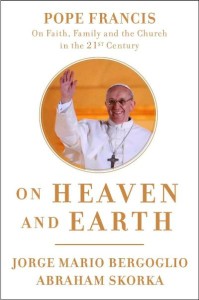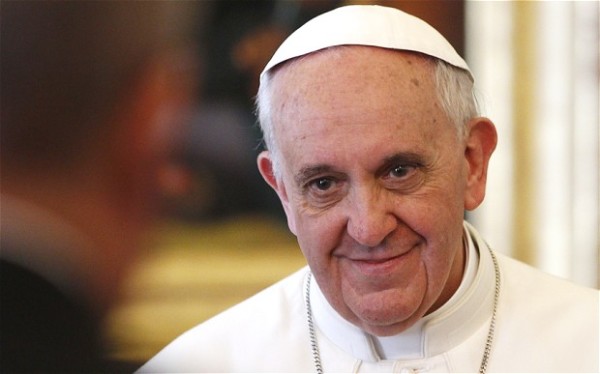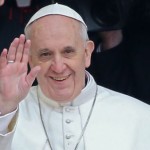Pope Francis on Atheism
by Pope Francis
Filed under Atheism
Before he was elected Pope Francis, Cardinal Jorge Mario Bergoglio spent fourteen years as archbishop of Buenos Aires, Argentina. During that time he built a strong friendship with Abraham Skorka, an Argentinian rabbi and biophysicist. Together they promoted interreligious dialogue on faith and reason, seeking to build bridges among Catholicism, Judaism, and the world at large.
Last month, Image Books released the English translation of On Heaven and Earth, originally published in Argentina in 2010. The book contains several conversations between both men where they discuss various theological and worldly issues, including God, fundamentalism, abortion, homosexuality, euthanasia, same-sex marriage, and globalization. From these personal and accessible talks comes a first-hand view of the man who would become pope to 1.2 billion Catholics around the world in March 2013. In the excerpt below, the two men share their thoughts on modern atheism and agnosticism.
Cardinal Bergoglio (Pope Francis):
When I speak with atheists, I will sometimes discuss social concerns, but I do not propose the problem of God as a starting point, except in the case that they propose it to me. If this occurs, I tell them why I believe. But that which is human is so rich to share and to work at that very easily we can mutually complement our richness. As I am a believer, I know that these riches are a gift from God. I also know that the other person, the atheist, does not know that. I do not approach the relationship in order to proselytize, or convert the atheist; I respect him and I show myself as I am. Where there is knowledge, there begins to appear esteem, affection, and friendship. I do not have any type of reluctance, nor would I say that his life is condemned, because I am convinced that I do not have the right to make a judgment about the honesty of that person; even less, if he shows me those human virtues that exalt others and do me good.
At any rate, I know more agnostic people than atheists; the first are more uncertain, the second are more convinced. We have to be coherent with the message that we receive from the Bible: every man is the image of God, whether he is a believer or not. For that reason alone everyone has a series of virtues, qualities, and a greatness of his own. If he has some vileness, as I do, we can share that in order to mutually help one another and overcome it.
Rabbi Abraham Skorka:
I agree with what you have said; the first step is respecting your fellow man. But I would add one more point of view. When a person says, “I am an atheist,” I believe he or she is taking an arrogant position. He who doubts has a more nuanced position. An agnostic thinks that he or she has not yet found the answer, but an atheist is 100 percent convinced that G-d does not exist. It is the same arrogance that leads some to assert that G-d definitely exists, just like the chair I am sitting on.
 Religious people are believers, but we do not know for certain that He exists. We can perceive Him in an extremely profound sense, but we never see Him. We receive subtle replies from Him. According to the Torah, Moses was the only person to have spoken directly, face to face, with G-d. As for everyone else—Jacob, Isaac, etc.—the presence of G-d appeared to them in dreams or by some messenger. Even though I personally believe that G-d exists, it is arrogant to say that He exists as if it were just another certainty in life. I would not casually affirm His existence because I need to live the same humility that I demand of the atheist. The right thing to do would be to point out—as Maimonides did in his thirteen principals of faith—that “I believe with complete faith that G-d is the creator.”
Religious people are believers, but we do not know for certain that He exists. We can perceive Him in an extremely profound sense, but we never see Him. We receive subtle replies from Him. According to the Torah, Moses was the only person to have spoken directly, face to face, with G-d. As for everyone else—Jacob, Isaac, etc.—the presence of G-d appeared to them in dreams or by some messenger. Even though I personally believe that G-d exists, it is arrogant to say that He exists as if it were just another certainty in life. I would not casually affirm His existence because I need to live the same humility that I demand of the atheist. The right thing to do would be to point out—as Maimonides did in his thirteen principals of faith—that “I believe with complete faith that G-d is the creator.”
Following Maimonides’ line of thought, we can say what G-d is not, but we can never be sure of what G-d is. We can talk about His qualities and attributes, but in no way can we describe His form. I would remind the atheist that the perfection of the natural world is sending us a message. We can gain an understanding of how it works, but not its essence.
Cardinal Bergoglio (Pope Francis):
The spiritual experience of encounter with God is not controllable. One feels that God is there, one has the certainty, but he cannot control God. We are made to subdue nature; that is what God commands. We cannot, however, subdue our creator. As a result, in the experience of God there is always an unanswered question, an opportunity to be submerged in faith.
Rabbi, you said one thing, which in part, is certain: we can say what God is not, we can speak of His attributes, but we cannot say what He is. That apophatic1 dimension, which reveals how I speak about God, is critical to our theology. The English mystics speak a lot about this theme. There is a book by one of them, from the thirteenth century, The Cloud of Unknowing, that attempts again and again to describe God and always finishes pointing to what He is not. The mission of theology is to reflect and explain religious facts, and among them, God.
I would also classify as arrogant those theologies that not only attempted to define with certainty and exactness God’s attributes, but also had the pretense of saying who He was. The book of Job is a continuous discussion about the definition of God. There are four wise men that elaborate this theological search and everything ends with Job’s expression: “By hearsay I had heard of you, but now my eye has seen you.” (Job 42:5) Job’s final image of God is different from his vision of God in the beginning. The intention of this story is that the notion that the four theologians have is not true, because God always is being sought and found. We are presented with this paradox: we seek Him to find Him and because we find Him, we seek Him. It is a very Augustinian game.
Rabbi Abraham Skorka:
I believe with complete faith that G-d exists. As opposed to the atheist who is sure that He does not exist and does not entertain any doubts, I implicitly reveal a margin of uncertainty by using the word “faith.” At a minimum, I have to acknowledge what Sigmund Freud wrote: that we need the idea of G-d to temper our existential angst. Nevertheless, after having done an in-depth analysis of positions that negate the existence of G-d, I still believe. When my work was done, I still felt G-d’s presence. I retain a certain amount of doubt in any case since this is an existential problem and not a mathematical theory, although there is some room for doubt in mathematical theories as well.
That said, when we think about G-d we have to do so with special terminology. Everyday logic does not apply. Maimonides put forth that idea long ago. Agnostics will continue to create their famous paradoxes. For example, if G-d is omnipotent, surely He could create a rock that He Himself could not lift; but if He created such a rock, that would mean He is not omnipotent. G-d is above and beyond any logic and its paradoxes. Maimonides explains that He knows everything in its complete form. We have only limited knowledge. if we had the same understanding that G-d has, we would be Gods ourselves.
Related Posts
Notes:
- Apophatic is a term that refers to an intellectual approach to God through what is known as “negative theology.” Through this way, one attempts to describe god by what He is not, that is, what may not be said about His perfect goodness (“God is unknowable”). It stands in contrast with cataphatic or “positive” theology. ↩
Note: Our goal is to cultivate serious and respectful dialogue. While it's OK to disagree—even encouraged!—any snarky, offensive, or off-topic comments will be deleted. Before commenting please read the Commenting Rules and Tips. If you're having trouble commenting, read the Commenting Instructions.













